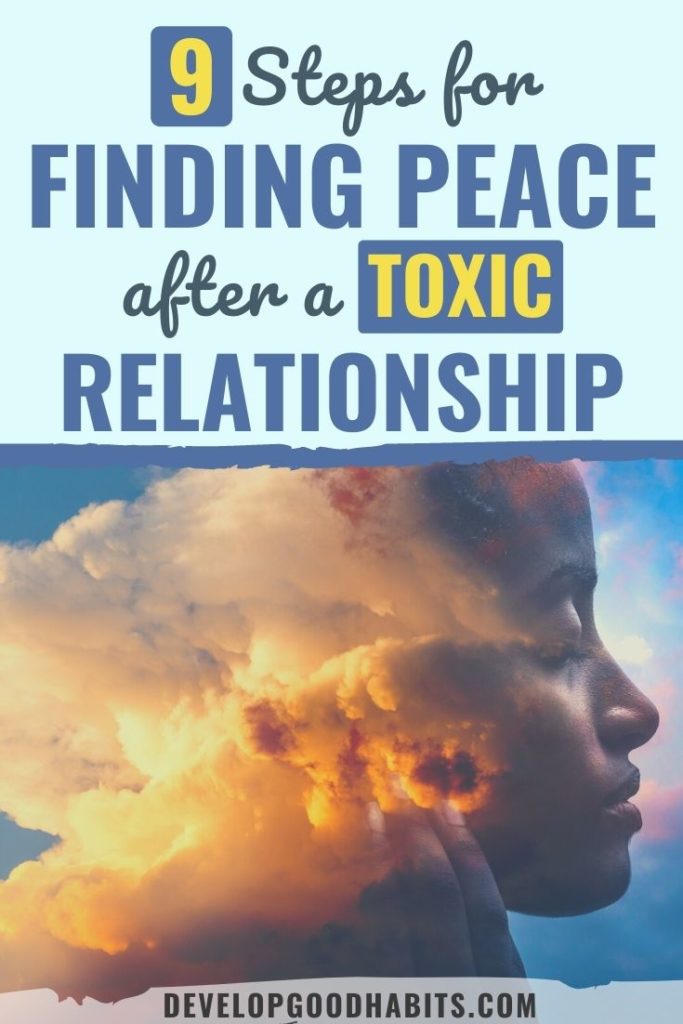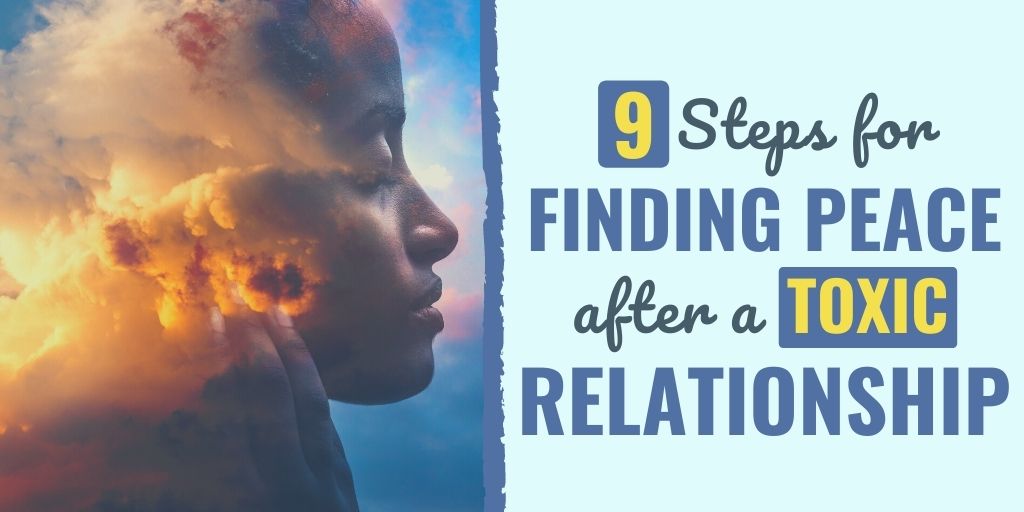The desire for harmony and balance becomes a lot stronger in the aftermath of a toxic relationship. You crave a normal, drama-free life, but how do you get it? Finding peace after a toxic relationship is possible, and I'm here to help you accomplish just that.
In this article, I’m going to start by explaining what this type of relationship looks like and how it affects you. I'll then share nine simple steps that helped me heal, recover, and thrive after ending an unhealthy relationship
But before diving in, know this: healing is vital for your well-being and I'm confident that you have the resilience to move past the pain.
What Is a Toxic Relationship?
Dr. Lillian Glass, Communicator and Psychology Expert, was the first to coin the term “toxic relationship.” In her 1995 book, Toxic People, she defined it as “any relationship [between people who] don’t support each other, where there’s conflict and one seeks to undermine the other, where there’s competition, where there’s disrespect and a lack of cohesiveness.”
Toxic people suck the energy out of you. They are impulsive, disrespectful, selfish, critical, controlling, abusive, spiteful, arrogant, judgmental, manipulative, and lack empathy. Some are wired to lie, cheat and blame others for their bad behavior. The relationship with them adds no value to your life. You're left feeling confused, misunderstood, unworthy, and undeserving of love.
Ways a Toxic Relationship Affects You
As good as it feels to have someone to love and be loved by, a new romantic relationship comes with risks. You can't foretell if it will last or end with a nasty breakup. We go in hoping for the best, and that's why a good romance turned bad evokes so much anger and sadness.
What's more, the stress and emotional damage from the putdowns, aggression, and mind-games by your partner will eventually take a toll on you emotionally, psychologically, and even physically. According to psychology experts, you'll also experience grief related to the loss of the relationship.
Grief? I, for one, find it ironic how we can get bent out of shape while detaching from a toxic person and a dysfunctional relationship we know wasn't good for us. But that's the nature of the beast. In addition to general grief, you may experience the following:
You may find yourself unable to cope with grief emotions such as shock, anger, and denial. While all of these reactions and feelings are normal, they can lead to chronic anxiety or depression. Some people resort to substance abuse or other maladaptive coping methods to deal with the emotional pain associated with the loss.
Finding Peace After a Toxic Relationship in 9 Steps
Knowing how to identify toxic people in the early dating phase will help you avoid their web of destruction and pain. They include pathological liars, narcissists, sociopaths, and those with an insecure attachment style.

Now that you've detached yourself from all the drama, it's time to focus on your inner peace, which, by the way, is a personal core value of many people. I hope following these nine steps to finding peace after a toxic relationship will help you get back to living life to the fullest. The gist of it is to utilize healthy coping strategies to increase your well-being long-term.
1. Accept the relationship was toxic.
Make no mistake; you're going to grieve the loss of this unhealthy relationship no matter how strong of a person you are. It's a loss you'll need to accept as part of the process of finding your peace after a toxic relationship.
Acceptance is the last stage of grieving the dead relationship and enables you to acknowledge the reality of what happened. You're not accepting your ex's wrongdoings. You're accepting that it's over. You're taking back your power from your toxic ex-boyfriend.
You'll finally get closure and are able to move on, without feeling bitter or cynical about love and romantic relationships.
2. Forgive yourself for not leaving sooner.
We know in our gut when a relationship isn't working and we won't get the type of love and respect we deserve from our partner. Yet, we hold on to the potential of what it can be—if only the person would change.
Chronically toxic people don't just change. Their toxic personality traits are deeply ingrained or linked to mental disorders such as narcissistic personality disorder (NPD) or borderline personality disorder (BPD). Cutting your losses and forgiving yourself for holding on too long to a broken relationship are the next best things to do.
Pardoning yourself is a huge act of self-love and is key to surviving and thriving. Self-forgiveness helps purge anger and resentment and stops you from beating yourself up over WHYs and WHAT IFs. It paves the way for peace since it enables you to let go of the idea that things could have happened differently.
3. Forgive your ex.
As much as you may hate how your ex treated you and desire to hold a grudge, it's necessary to forgive her. By no means are you excusing her bad behavior or letting her off the hook. However, you owe it to yourself to make peace with your experience through forgiveness.
Holding grudges, anger, and resentment doesn't hurt your ex. She doesn't even know or care what you're going through emotionally. Those are your feelings to process and release in order to regain your peace. Forgiving, in your own time, is fully accepting what happened did happen.
Your inner critic may tell you forgiveness is a sign of weakness. In fact, it's a sign of strength. It's about self-preservation through letting go of ill feelings toward your ex and directing compassion and love toward yourself.
Check out these anger management worksheets to help you work through your emotions.
4. Surround yourself with supportive people.
You'll need all the love and support you can get at such a critical time. Lean on the people in your support network who are compassionate and empathetic. Finding solace among loved ones can help you heal and rebuild your self-confidence faster.
Instead of hiding yourself away, draw closer to trusted family members and friends who know how to soothe you. These are the people you can bare your soul to without judgment or harsh criticism. You can always depend on them to give you positive feedback, hold you accountable, and uplift you with words of encouragement.
5. Up the ante on self-love.
Loving yourself through the experience is the ultimate way of finding peace after a toxic relationship. I'll tell you why. First, it's the greatest show of love and proves that you have high regard for your personal well-being and happiness.
Basking in self-love is an announcement that you're not going to settle for less than you deserve. Showing yourself love in the aftermath of an unhealthy relationship can take many forms. For example, acknowledging your missteps and trusting and being kind to yourself. Other acts include nourishing your body and creating boundaries for protecting your mental and physical health.
Through self-love, you're communicating that you matter and that you're willing to take care of your own needs instead of neglecting them to please others.
6. Get back to doing the things you love.
It's easy to lose yourself in a turbulent relationship since you spend so much time and energy trying to make it work. Once it's over, you realize you've wasted so much time on the wrong person—time you'll never get back. You've also neglected your needs, hobbies, and people who truly care about you.

Reconnecting with and rediscovering yourself and following your passion play an essential role in finding your peace after a toxic relationship. What was it that you gave up for that toxic man or woman? Was it your love for painting, writing, journaling, podcasting, or taking morning walks? These are the things that bring you peace and joy. Instead of drama, you derive pure satisfaction.
7. Live in the present.
Ruminating, or going over past events over and over in your mind, is one of the unhealthiest psychological behaviors. It causes you to overthink events and experiences and keeps you stuck in the past. You may engage in what is called bargaining, another stage of grief where you ask a lot of “what if” questions. “What if I gave more of myself? Would it have worked?”
Be thankful the relationship is finally over and you have your life back!
Focusing on the present (mindfulness) is a healthy mental practice as it keeps you at ease and at peace. Mindfulness is a type of meditation technique that teaches you to live consciously in the moment. You'll learn how to accept events, thoughts, and feelings for what they are without criticism or judgment.
Practicing mindfulness helps you manage the tendency to overthink things and dwell on the past.
8. Talk to a mental health professional.
Anger and confusion are normal emotions you'll feel in the aftermath of a chronically unhappy relationship. As reality starts kicking in, you may ask yourself or anyone who cares to listen, “What in the world just happened?” You'll want to know if you're overthinking things, overreacting, or are truly suffering the effects of a traumatic relationship.
A behavioral therapist can help if you have trouble coping or are experiencing anxiety or depression associated with post-traumatic stress. Your therapist will offer new perspectives on what transpired and help you process your feelings using healthy coping strategies.
9. Remind yourself of your worth.
A toxic relationship leaves you feeling terrible about yourself even if you're known for having high self-esteem and self-confidence. No matter how self-assured you are, your self-worth will take a hit after dealing with a narcissist or someone who lied, cheated, abused, or manipulated you.
Positive self-affirmations worked wonders for me after quitting someone with traits of a covert narcissist. He wanted to hold onto me but is wholly incapable of meeting my emotional needs. I chose myself over him.
You have to preserve yourself from people who don't care about you. You must reassure and build yourself up. Start with the habit of reciting phrases like, “I am worthy.” “I am beautiful.” “I am deserving of love.” “I am enough.” Repeat these and other positive self-affirmations over the next three weeks. It will take at least 21-30 days to build this new habit.
Final Thoughts on Finding Peace after a Toxic Relationship
There's no doubt that toxic partners make your life a living hell. Providing it's safe to do so, ending the relationship is one of the best decisions you'll ever make. There's going to be an unmistakable sense of a heavy burden being lifted off you and you will breathe again.
Give yourself time… and before long you’ll begin to feel energetic, alive, beautiful, confident, and emotionally ready to establish new, meaningful relationships. Time heals all wounds, this I promise.
And if you’re lucky, and smart about things, you’ll avoid repeating the pattern with your next relationship by learning to recognize the 15 Warning Signs you’re dealing with a Toxic Person. This will save you a lot of grief and negative self-talk in the future.


